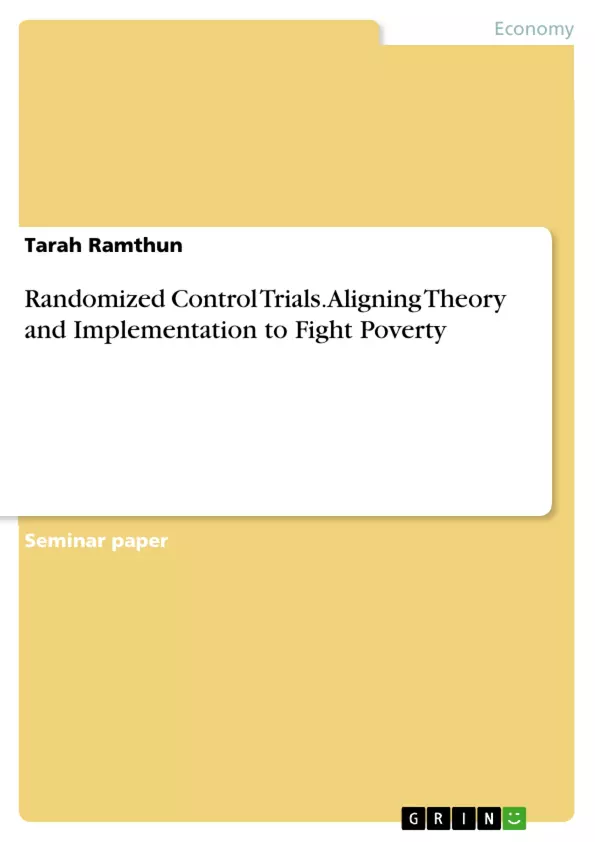This paper seeks to answer in which ways Esther Duflo contributed to the history of economic thought and whether she really has revolutionized the scientific landscape. To answer the question, the first step is to outline the general framework. For this purpose, I will provide an overview of Duflo's biographical career. In the following, I will discuss the method of RCTs and the historical progression of RCTs from the medical field to the social sciences and further explain the methodology itself. Afterwards, possible advantages and disadvantages of RCTs will be examined. In order to assess Duflo's concrete work and her influence on development economics in closer detail, the methodology of RCTs will be illustrated by the discussion of some of her works. Finally, I will evaluate her contribution to the history of economic thought within the field of development economics.
Inhaltsverzeichnis (Table of Contents)
- Introduction
- Short biographical introduction: Esther Duflo
- Randomized Control Trials
- How do RCTs work?
- Development and history of RCTs and application to social sciences
- Statistical biases in experiments and RCTs as a possible solution
- The initial situation: reasons of statistical bias
- How RCTs can solve problems of statistical bias
- Further advantages of RCTs: substitute for counterfactuals and observational data
- Criticism and limits of RCTs in social sciences
- Lacking external validity
- Threats to internal validity
- Ethical concerns
- Further weaknesses of RCTs
- RCTs as the gold standard?
- Examples of Esther Duflo's work
- Contributions of Esther Duflo to the History of Economic Thought
- Esther Duflo as a figure of female empowerment
- Linking theory and practice
- Extending the scope of development economics
Zielsetzung und Themenschwerpunkte (Objectives and Key Themes)
This paper aims to explore the contributions of Esther Duflo to the history of economic thought, particularly within the field of development economics. It will examine how her work, centered around the use of Randomized Control Trials (RCTs), has impacted the scientific landscape and whether it has truly revolutionized research methodologies.
- The development and application of Randomized Control Trials (RCTs) in social sciences, specifically in the field of development economics.
- The advantages and limitations of RCTs in assessing the effectiveness of interventions, including considerations of external validity, internal validity, and ethical concerns.
- The influence of Esther Duflo's work on the understanding and approach to global poverty alleviation, focusing on her key findings and the impact of her research.
- The significance of Esther Duflo's contributions to the broader field of economic thought, highlighting her role as a figure of female empowerment and her emphasis on linking theory and practice.
- The ongoing debate surrounding the effectiveness and limitations of RCTs as a research methodology in the social sciences.
Zusammenfassung der Kapitel (Chapter Summaries)
The introductory chapter explores the motivation behind Esther Duflo's work, emphasizing her commitment to understanding poverty in its complexity and challenging the common reductionist approaches prevalent in social theory. The chapter also introduces the concept of Randomized Control Trials (RCTs) and their growing influence in development economics.
The second chapter provides a biographical overview of Esther Duflo's career, outlining her academic background, key achievements, and the collaborations that have shaped her work. The chapter highlights her early exposure to the realities of poverty and her dedication to finding effective solutions.
The third chapter delves into the methodology of Randomized Control Trials (RCTs), tracing their historical progression from the medical field to the social sciences. It outlines the process of conducting an RCT, including the random assignment of subjects to treatment and control groups, and explores the potential advantages of this approach in determining causal relationships.
The fourth chapter critically examines the criticisms and limitations of RCTs in social sciences. This includes discussions about their potential lack of external validity, threats to internal validity, ethical concerns, and the potential narrowing of research topics. The chapter explores the ongoing debate surrounding the status of RCTs as the “gold standard” in research.
The fifth chapter showcases examples of Esther Duflo's work using RCTs in development economics. It delves into specific research projects and their findings, offering concrete illustrations of how RCTs can be applied to address various aspects of poverty.
Schlüsselwörter (Keywords)
The key themes of this paper revolve around the use of Randomized Control Trials (RCTs) in development economics, particularly in the context of Esther Duflo's work. This includes exploring the historical development of RCTs, their advantages and limitations, the impact of Duflo's research on the understanding and alleviation of poverty, and the broader implications for the field of economic thought.
Frequently Asked Questions
What are Randomized Control Trials (RCTs)?
RCTs are a research methodology where subjects are randomly assigned to a treatment or control group to determine the causal effect of an intervention.
How did Esther Duflo contribute to development economics?
Duflo popularized the use of RCTs to study poverty, linking economic theory with practical implementation and challenging reductionist social theories.
What are the advantages of using RCTs in social sciences?
RCTs help solve problems of statistical bias, serve as a substitute for counterfactuals, and provide robust evidence for the effectiveness of social programs.
What are the main criticisms of RCTs?
Criticisms include a potential lack of external validity (generalizability), ethical concerns regarding treatment denial, and the risk of narrowing research to "testable" topics only.
Are RCTs considered the "gold standard" of research?
While often called the gold standard for internal validity, the paper explores the ongoing debate about their limits in complex social environments.
- Citation du texte
- Tarah Ramthun (Auteur), 2022, Randomized Control Trials. Aligning Theory and Implementation to Fight Poverty, Munich, GRIN Verlag, https://www.grin.com/document/1252970



